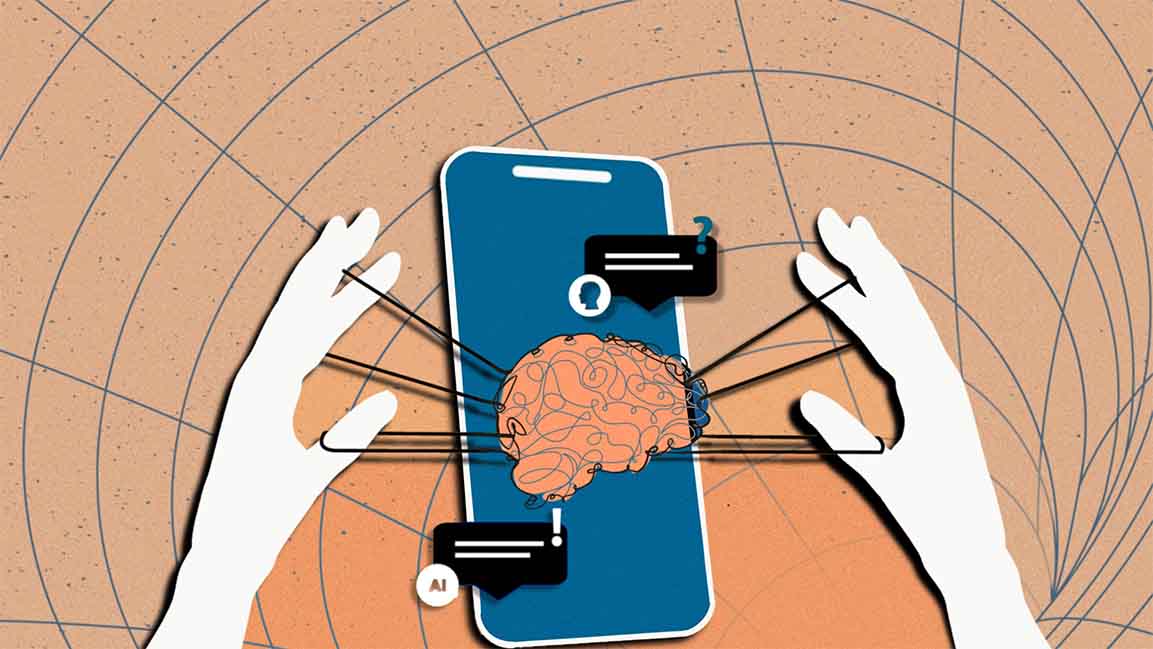- | 9:00 am
There is a huge mental healthcare gap in the Middle East. Can AI bridge it?
Experts weigh in on the challenges, benefits, and ethical considerations associated with integrating AI into mental health practices

Anonymous, not sitting across from another human being, last week, I told my therapist I was going through a cycle of anxiety. The response, I received was something a mediocre therapist would say or even a stranger walking down the street could tell me: “Be grateful for the little things while being mindful of existence.”
It seemed easier to accept the useless advice than confront it, and I have wondered for a while if talking to a professional might be better.
My therapist was an AI-powered chatbot, an app installed on my phone – Woebot. It is one of the few apps employing AI to address anxiety and depression.
In the Middle East and North Africa (MENA) region, where mental health problems are widespread, constituting a significant proportion of the overall disease burden, AI-assisted therapy could be a plausible solution for the lack of mental healthcare.
Reportedly, in Jordan, Oman, Kuwait, and Qatar, mental health conditions relative to the total disease burden surpass twice the global average of 5%.
Experts believe that the impending years may witness a heightened burden of mental illness in the region, fueled by a young population.
So, the question is not, can AI replace traditional therapy, but how well can it supplement it? What are the gaps that exist in chatbot-administered and human-centered therapy? And to what extent has AI developed to understand a process with humanness at its core?
The application of AI in mental health presents distinct challenges. Dr. Maya Bizri, Assistant Professor in Psychiatry and Psychosomatic Medicine and Director of Psycho-Oncology at the American University of Beirut Medical Center, refutes the notion that AI cannot find a place in psychiatry. She contends that advancements in brain health, particularly behavioral health, have made considerable progress.
Drawing a parallel between frustrating interactions with virtual assistants like Siri or Alexa and the limitations of service provider bots for technical help, Sarmistha Mitra, the Founder and Owner of the Wellbeing Sanctuary in Dubai, is skeptical about whether a machine can replicate the intricate nuances of a conversation with a human therapist.
Despite the complexity of these areas, Dr. Bizri and Mitra advocate for the use of AI in addressing gaps in mental health care, particularly in mitigating disparities in access to mental health providers.
CHALLENGES AND CONTROVERSIES
Despite advancements in natural language processing and machine learning, critics point out that the complexity of human emotions and the dynamic nature of therapeutic interactions remain roadblocks for AI to grasp.
“There is an added value to AI that we as humans may not have the capacity to account for, which is combining a huge amount of personal data that therapists routinely may not have access to,” says Dr. Bizri.
Perhaps the biggest blow to AI’s use in therapy is a lack of understanding.
“There’s research suggesting connections can be formed with chatbots, but can they navigate the complexities of our emotions, traumas, and personal experiences?” asks Mitra.
Imagine pouring your heart out to a machine and getting a pre-programmed response. “It’s like expecting a robot to deliver the same emotional support as a friend during tough times,” she adds.
Another drawback of the mass rollout of AI-assisted mental health care is the likelihood of a more dehumanized world. According to Dr. Bizri, there are benefits to the dehumanization of mental health care, such as cost-effectiveness, efficiency, lack of bias, and the ability to gather a more comprehensive patient history.
However, she emphasizes that, at present, these advantages are complementary to the essential patient-provider interaction. Dr. Mitra envisions a future healthcare model in which AI is the initial point of contact for seeking help, guiding, and directing individuals toward appropriate providers.
This two-step process could involve AI addressing basic mental health needs and subsequently identifying cases that require more serious or advanced therapy modalities, facilitating a seamless transition to human-provided care.
MAN VS. MACHINE: UNCHARTED TERRITORY FOR AI
Research to validate the effectiveness of AI-assisted therapy and whether it can function independently or only as a complement to traditional providers is still needed. If studies consistently demonstrate its efficacy, prioritizing the knowledge it works might outweigh the need to understand precisely how it operates.
“As therapists, the essence of our work lies in tailoring and tweaking every therapy session to meet each client’s unique requirements. Each person brings a different story and a unique set of challenges, and our role is to adapt, evolve, and create a therapeutic space that resonates with them. It’s in these personalized adjustments that the true power of therapy unfolds, fostering a connection and progress that’s genuinely transformative,” says Mitra.
So, how far are we from a future where AI-assisted chatbots fully replace human interaction?
“The challenge remains in empathy, which represents a distinctly human trait that would be difficult to embed within an algorithm,” says Dr. Bizri.
This raises the question of whether the need for a strong patient-provider connection is exclusive to therapists and psychiatrists or extends to all healthcare providers. Dr. Bizri emphasizes that the experience, rapport, and connection established in any medical setting can significantly influence a patient’s perception of whether they will receive effective assistance, irrespective of the provider’s credentials.
“And at this point, AI cannot mimic that in any setting,” she says.








































